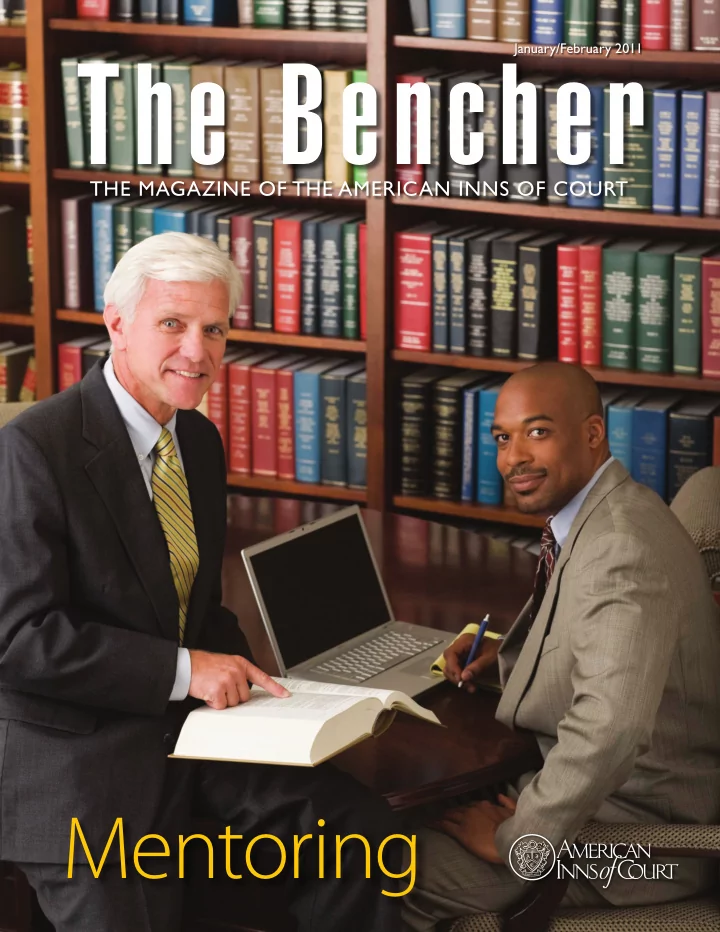

January/February 2011 The Bencher THE MAGAZINE OF THE AMERICAN INNS OF COURT Mentoring
Outside the Box: Mentoring d n a l a m s m r o a F r g m o r r P i F g w n a i r L o t g n n e i v M o r l p a BY NICOLE C. H. MASSEY m m r I o f n I This article, used with permission from the American Inns of Court and Nicole C.H. Massey, Esquire, was originally published in the January/February 2011 issue of The Bencher , a bi-monthly publication of the American Inns of Court. Inquiries about this article should be directed to the American Inns of Court
M entoring is a hot topic for law mentoring programs are sufficient to meet the firms these days, particularly professional development needs of young associ- during recruiting season. ates. While formal mentoring programs can prove Law firms often tout their very effective in some circumstances, even the best formal mentoring programs formal mentoring program does not equate to when wooing potential new effective firm-wide mentoring, much less universal associates; they claim that success in professional development. the programs provide the key to integrating new This article will discuss lawyers into the firm and facilitating professional First and foremost, a few suggestions for development. Firm recruiting websites encourage how the members of grand visions that, through such formal mentoring the mentoring the American Inns of programs, new associates are swiftly introduced Court might tweak their relationship should be to grandfatherly (or, perhaps, grandmotherly) firms’ formal mentoring senior partners who then gently guide the associ- programs to make them recognized for what it is: ates’ careers. Associate mentors, glossy recruiting more successful. These brochures imply, help new associates learn the a beneficial partnership, suggestions are hardly fundamentals of law practice, introduce them to scientific; they are gleaned countless colleagues, and share in their mentees’ but one that requires from contrasting my pain and triumphs. own positive mentoring effort on both sides The realities, at least from the perspective of young experiences at my law firm lawyers like myself and my friends, are often quite with some of my friends’ to be successful. different. While formal mentoring programs help less positive experiences some associates develop a positive and lasting at theirs, as well as my professional relationship with a senior attorney experiences participating in other not-for-profit at their firms, the experiences of many others are mentoring programs for children. The article also far less ideal. For example, some friends of mine encourages the group’s members to recognize the at other firms were brusquely introduced to their limits of formal mentoring programs, and encour- “mentor” on their first day of work, never to hear ages attorneys to develop a “mentoring culture” from that person again. Others went out to lunch at their firms that can pick up where a formal with their mentor in the first week of the job, but mentoring program often leaves off. quickly surmised that the two did not have much Maximizing formal mentoring in common. Despite the best of intentions on both sides, within a year, most of these associates only programs speak with their “mentor” at occasional firm events, One of the easiest ways that a firm can cultivate and even then only make small talk. more meaningful mentoring relationships is by Such results aren’t terribly surprising. Law firms improving the structure of its existing formal attempting to jump start a mentoring relationship mentoring program. First and foremost, the are in a difficult situation. Most formal mentoring mentoring relationship should be recognized for programs are led by attorneys, like the members what it is: a beneficial partnership, but one that of the American Inns of Court, who appreciate and requires effort on both sides to be successful. Many value mentoring relationships and genuinely desire firms make participation in the mentoring program a supportive firm culture for their firm’s new associ- obligatory not only for the new associates, but also ates. These attorneys and their firms are leading the for the associate and partner mentors assigned to proverbial horses to water through formal mentoring them. A forced mentoring relationship—particularly programs, but how can they make them drink? one with no direction—is almost sure to fail. Indeed, one not-for-profit mentoring organization in which I believe that many law firms make two fundamen- I participated required mentees to sign a commit- tal mistakes with their formal mentoring programs. ment to spend the time necessary to develop a The first is that they assume that if they choose relationship with their mentor before they could be the right group of mentors, those mentors can assigned one. This emphasized to both the mentor be of service to most any associate. In my view, and the mentee that a successful relationship might that assumption is wrong, and formal mentoring be rewarding, but it would take effort to reap those programs can be improved dramatically by simply rewards. While formal law firm mentoring programs paying more attention to the mentor-mentee might not go to that extreme, they could be signifi- pairing process. The second fundamental mistake that many law firms make is assuming that Continued on the next page. The Bencher ◆ January/February 2011 ◆ www.innsofcourt.org 17
Recommend
More recommend